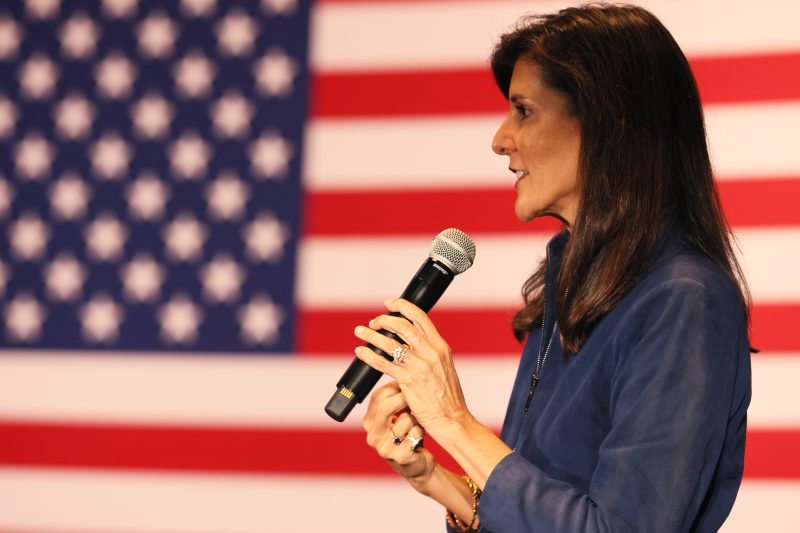MANCHESTER, N.H. — Presidential campaign videos can be instructive. Four years ago, then-candidate Joe Biden opened his bid for the White House by focusing on the 2017 neo-Nazi, white supremacist demonstrations in Charlottesville that left one person dead. Nikki Haley’s opening video, released last week, treats racial issues in a much different way.
In Haley’s video, there are two images from the New York Times Magazine’s “1619 Project,” which has drawn both criticism and praise from academic historians as it attempted to refocus attention on slavery’s central position in the American story. In doing so, it has become a flash point among conservative politicians. The video also highlights the 2015 mass shooting at Mother Emanuel African Methodist Episcopal Church in Charleston, where a White stranger killed nine Black people at a Bible study class. It does not mention Haley’s subsequent action to remove the Confederate flag from the South Carolina State House after years of controversy.
That absence is notable, given how significant the decision was to her tenure as governor and to the history of the state. Instead, in her opening days as a candidate, she has chosen to deal in political hot buttons on racial issues rather than demonstrating the kind of approach she employed at a critical moment during her leadership.
A former governor and a former U.S. ambassador to the United Nations, Haley is the first candidate to formally challenge former president Donald Trump for the 2024 Republican presidential nomination. As other prospective candidates hang back — among them Florida Gov. Ron DeSantis — Haley is all in. She is self-assured, reminding audiences that she has beaten the odds in the past and declaring that she intends to do so again.
She runs as other governors have run, as an outsider ready to shake up the U.S. capital. A favorite line is that it is time “to send a badass Republican woman” to the White House to fix America’s problems. When she talks about taking on bullies, she notes, “And when you kick back, it hurts them more if you’re wearing heels.”
Haley got an unexpected boost this past week when CNN anchor Don Lemon maladroitly referred to her, at age 51, as “past her prime,” a comment with clear sexist meaning. His characterization ricocheted across social media and cable television, prompting him to issue an apology. Haley made sure through her own social media feed that his words received maximum attention, to her benefit.
Haley’s message conveys toughness, whether aimed at Washington politicians of both parties — she favors term limits for members of Congress — or federal government spending practices. “I’m not a lawyer; I’m an accountant,” she says. Internationally, she aims fire at the Chinese, the Russians, the Iranians and the North Koreans.
Her message also includes a heavy dose of generational change. She says there should be mental-competence tests for candidates over the age of 75, a dig at both Trump (age 76) and President Biden (age 80). She is consistently harsh on Biden but mostly gentle in her treatment of Trump.
After announcing her candidacy in Charleston, S.C., on Wednesday, she packed the Exeter, N.H., Town Hall on Thursday night and filled the New Hampshire Institute of Politics at St. Anselm College to capacity on Friday evening. In the coming days, she heads to Iowa.
Her opening week has run smoothly, earning praise from veterans of New Hampshire politics. Many people doubt her chances in a field in which Trump and the undeclared DeSantis currently dominate. She is saying: Underestimate me at your peril.
The turnout in New Hampshire reflects what seems to be a hunger among citizens to start a process that has been slower to get going than in past cycles. It also may indicate that many Republican voters are looking for an alternative to Trump. At this stage, Haley’s trajectory is unpredictable, but it was clear from the audiences’ reactions that among Haley’s attributes is an ability to connect with people. In Exeter and Manchester, she was thronged by selfie-seekers.
Haley grew up in the rural community of Bamberg, S.C., which has a population today of about 3,000. Her parents emigrated from India. The town was divided racially, a legacy of the Jim Crow South and, she says, by railroad tracks.
“I was different,” she says, neither Black nor White, but a brown-skinned girl who broke barriers to become the first Indian American female governor in the country. She could see racial discrimination in her hometown and could feel prejudice personally, whether because of her race or gender, as she climbed the political ladder.
She inveighs against suggestions that the United States is a racist nation, using that characterization as a foil to say that she instead sees an America that is “strong and proud, not weak and woke.”
Her education message includes condemnation of critical race theory, another frequent target of conservatives, which she says teaches White children that they are bad and Black and Brown children that they are never going to be good enough and always victims. That is a caricature of a somewhat dense academic theory that is rarely, if ever, a formal part of elementary or high school curriculums. But it is now part of political positioning.
When she highlights the tragic shooting at Mother Emanuel AME Church in her opening video, she speaks of her state’s turning to its basic values and religious faith for healing. Absent is any reference to what was one of the most courageous decisions she made as governor.
For years, her state was embroiled in controversy over the fact that, more than a century after the Civil War, the Confederate flag continued to fly atop the capitol dome in Columbia. The flag was defended by many in the state as part of South Carolina’s heritage, even though for Black citizens and many Whites, it was a symbol of racism. For national Republican politicians, it was an issue they avoided touching.
During his 2000 campaign for president, Arizona Sen. John McCain tied himself in knots whenever he was asked about his position. One day, he called the Confederate flag “a symbol of racism and slavery,” only to say soon after that it was “a symbol of heritage.” Eventually, the man who prided himself on straight talk fell back on anodyne words designed not to offend the citizens of the state while concealing his true feelings. His discomfort was palpable.
After he lost the South Carolina primary to then-Gov. George W. Bush, McCain apologized for choosing “to compromise my principles” in the hope of avoiding defeat. He said he had always believed the flag should come down from atop the State House, adding that his apology was not intended “to evade criticism for my failure.” Later that year, the legislature voted to take the flag down from the State House dome, but in a compromise, it was still to fly from a flagpole on the capitol grounds.
Haley moved swiftly after the killings in Charleston, rallying support to finish what had been started years earlier. She said the shooter, Dylann Roof, had a “sick and twisted” view of the Confederate flag, one that did not reflect the view of many who still regarded it as “a symbol of respect, integrity and duty” and who saw it as a memorial. But she also said that for many others, that flag was a symbol “of a brutally oppressive past.” Freedom of expression would allow those who revered the Confederate flag to fly it on their property, she said. “But the State House is different,” she added. “It’s time to move the flag from the capitol grounds.” And so it was.
Haley said something else that day: “On matters of race,” she said, “South Carolina has a tough history. We all know that. Many of us have seen it in our own lives — in the lives of our parents and our grandparents. We don’t need reminders. Despite last week’s tragedy, we have come a long ways since those days and have much to be proud of, but there’s more we can do.”
There are differing views on the question of whether the United States is a racist nation. But is there any question that racism and ethnic discrimination remain a force? The mass killing in South Carolina when Haley was governor was a racial killing. In 2018, 11 members of Tree of Life synagogue in Pittsburgh were killed in an antisemitic attack. In 2019, a man who had posted a warning about a “Hispanic invasion” drove to a Walmart store in El Paso and killed 23 people. In 2022, a shooter targeted Black patrons in a Buffalo grocery store, killing 10, in a racist attack.
Political campaigns are crude instruments for conversations about issues as complicated and searing as the United States’ racial history and its racial present. Haley has seen and experienced the issue her entire life. She views herself as emblematic of the country’s openness to members of all races. Whether she will address the issue with sensitivity, as she did with the Confederate flag, or instead push political hot buttons is for her to decide.
A previous version of this article misstated the name of the killer in the 2015 mass shooting at Mother Emanuel African Methodist Episcopal Church in Charleston, S.C. He is Dylann Roof, not Dylan Weeks. This article has been corrected.








